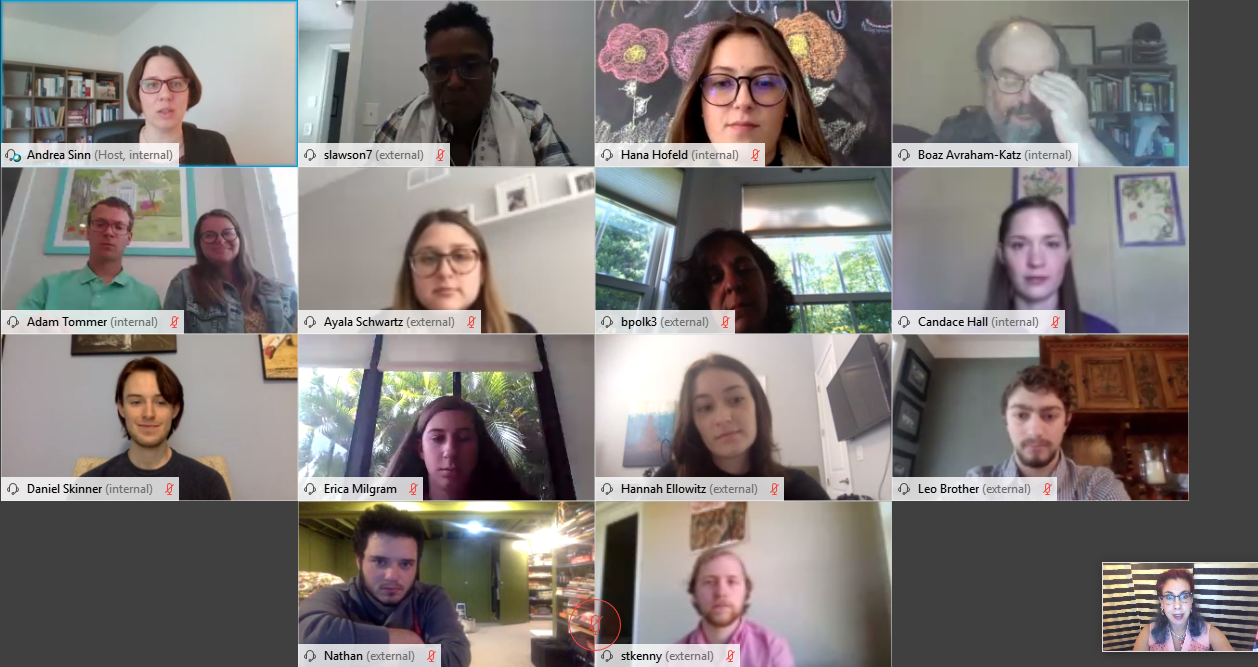Elon community gathers to commemorate Yom HaShoah virtually.
This year’s ceremony for Yom HaShoah, Day of Remembrance of the Holocaust and Heroism, might not have been traditional, but it was filled with meaning, and thanks to its virtual nature, resonated far past Elon’s campus.
Leo Brother ’22 participated from his family’s home in Massachusetts. “Of course, our current situation made it impossible to gather as a community to reflect and remember in the ways that we normally do,” Brother said. “I felt an even stronger connection this year when I logged on to a WebEx call with my peers and read testimonies from those who witnessed the evils of the Nazi regime firsthand. It was a chilling, yet uplifting reminder that our community is strong, and will overcome any obstacle to ensure that we don’t forget our unshakable ability to persevere.”
The Elon community gathers annually to commemorate the victims of the Holocaust through the Reading of the Names and for a Ceremony of Remembrance, to remind us all of the terrible deeds that can be carried out when bigotry, hatred, and indifference are regarded as normal.
The coronavirus might have disrupted the plans for a traditional communal gathering of commemoration, but the pandemic also added a different meaning for the participants.
Elon students, faculty and staff gathered virtually and shared quotes and stories to remember the lives of those who died as a result of the racial purity measures in German-controlled Europe during World War II to honor those who survived and remind of their experiences during this dark time.
Additional Media
Traditional in-person gatherings and ceremonies of remembrance often feature speakers, multi-media, and music, and the Elon ceremony’s organizer, Instructor Boaz Avraham Katz, made sure the online version was rich and engaging.
“Working on this ceremony virtually was slightly different than creating an in-person one,” explained Avraham-Katz. “In order for to be impactful we needed to ensure to create a very visual ceremony and so the idea of the Power point was born. It allowed people to listen but also ‘see’ the ceremony.”
And so the ceremony, a collaboration between Jewish Life and Jewish Studies, featured music, prayers, readings, and quotes visually displayed and narrated by participants.
Hana Hofeld ’22 from Illinois read the words of Holocaust survivor Dania Rosen during the ceremony, and took away meaning from Rosen’s call to memorialize the atrocities of those dark times: “In a time like this, I want to do everything I can to help remember and celebrate the liberation of the Jews who survived the Holocaust,” Hofeld said. “It was a beautiful ceremony and I’m glad we could use our technology for the greater good of our community.”
Jewish communities across the globe read names and shared stories of the victims, to help ensure that their memories are never forgotten and to emphasize the depth of loss during the Holocaust.
“An important part of the Jewish tradition is our obligation to remember our history and to tell it regularly, so that generations to come can learn from our past and improve our future,” said Brother, emphasizing the importance of memory.
Assistant Professor of History Andrea Sinn, who heads the Jewish Studies program, is optimistic about the future. “As much as we hope to be reunited on campus next year to honor those who perished by reading their names, this year reminded us that there is community in isolation, and community goes beyond the physical spaces on Elon’s campus,” Sinn said.



